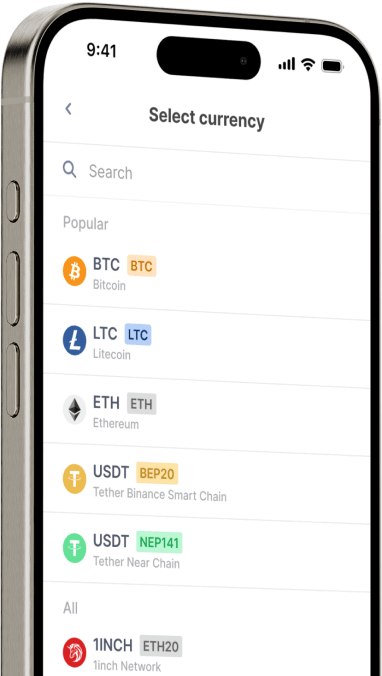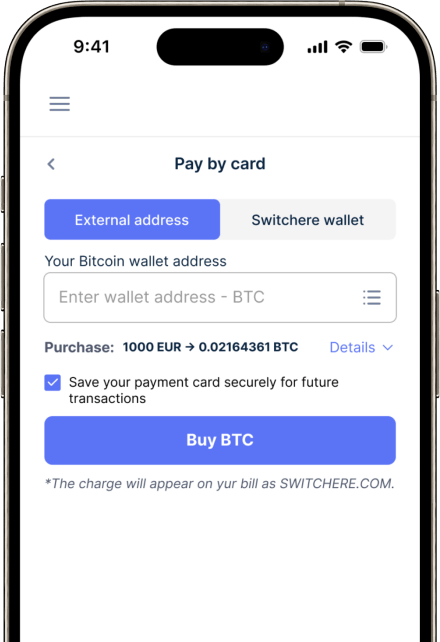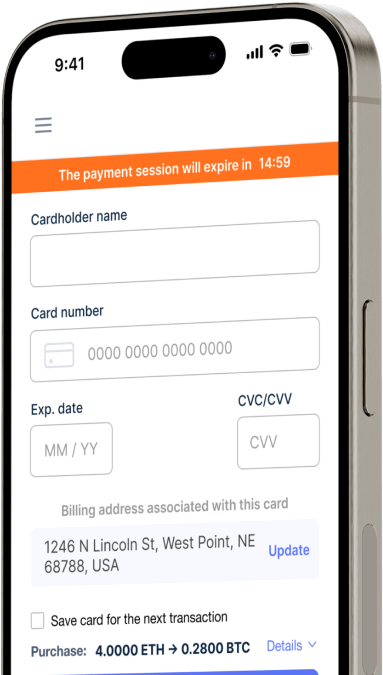Convertire
Philippine Peso (PHP) in Binance USD (BUSD) istantaneamente
Acquistate facilmente Binance USD (BUSD) con Philippine Peso (PHP) su Switchere e beneficiate di transazioni rapide e sicure.
Circa
Binance USD (BUSD)
BUSD (BUSDBSC) è una stablecoin regolamentata, sostenuta da fiat e ancorata 1:1 al dollaro USA, progettata per fornire stabilità di prezzo nel volatile panorama degli asset digitali. Emessa da Paxos Trust Company in collaborazione con Binance, BUSD mira a offrire un mezzo di scambio e una riserva di valore affidabili. Il ticker "BUSDBSC" indica specificamente la sua presenza come token BEP-20 sulla BNB Smart Chain, una rete decentralizzata ad alte prestazioni che facilita ampie applicazioni DeFi. La tecnologia di base di BUSD si basa su riserve trasparenti e verificate di dollari USA detenute in conti dedicati, garantendo che ogni token sia supportato da una quantità equivalente di valuta fiat. Ciò contrasta con le stablecoin algoritmiche, offrendo un approccio diverso al mantenimento del peg e della sicurezza crittografica.
L'utilità principale di BUSD, in particolare della sua variante BUSDBSC, è quella di consentire transazioni e partecipazioni senza soluzione di continuità nell'ecosistema della BNB Chain con un rischio di prezzo minimo. La sua tokenomica è semplice: nuovi BUSD vengono coniati quando i dollari vengono depositati presso Paxos, e bruciati quando vengono riscattati, mantenendo la copertura 1:1. Tra i principali casi d'uso vi sono la negoziazione contro altre criptovalute su borse come PancakeSwap, la funzione di garanzia nei protocolli di prestito e di indebitamento, la coltivazione dei rendimenti all'interno di varie applicazioni DeFi e la facilitazione dei pagamenti peer-to-peer. In quanto stablecoin approvata dal NYDFS (per la versione Ethereum emessa da Paxos) e ampiamente adottata, BUSD svolge un ruolo significativo nel fornire liquidità e una rappresentazione affidabile e conforme del dollaro digitale su varie piattaforme tecnologiche blockchain, fungendo da elemento fondamentale per molte infrastrutture Web3 e attività finanziarie on-chain.
Acquistare altre 150+ criptovalute per Philippine Peso (PHP)
Altre monete per Philippine Peso (PHP)
-
PHP per ZRX
-
PHP per 1INCH
-
PHP per AAVE
-
PHP per ACH
-
PHP per ALGO
-
PHP per TLM
-
PHP per ANKR
-
PHP per APE
-
PHP per NFT
-
PHP per API3
-
PHP per APT
-
PHP per ARPA
-
PHP per AUDIO
-
PHP per AVAX
-
PHP per AVAX
-
PHP per AXS
-
PHP per BADGER
-
PHP per BAL
-
PHP per BNT
-
PHP per BAT
-
PHP per BNB
-
PHP per BUSD
-
PHP per BSW
-
PHP per BSV
-
PHP per BLUR
-
PHP per BONE
-
PHP per CTSI
-
PHP per CELR
-
PHP per CELO
-
PHP per CEL
-
PHP per LINK
-
PHP per CHZ
-
PHP per CHR
-
PHP per C98
-
PHP per COMP
-
PHP per CFX
-
PHP per PEOPLE
-
PHP per CVX
-
PHP per ATOM
-
PHP per CTC
-
PHP per CRV
-
PHP per DAI
-
PHP per DASH
-
PHP per MANA
-
PHP per DENT
-
PHP per DGB
-
PHP per LEASH
-
PHP per DYDX
-
PHP per XEC
-
PHP per EOS
-
PHP per ETC
-
PHP per ENS
-
PHP per ETHW
-
PHP per FET
-
PHP per FIL
-
PHP per FLOKI
-
PHP per GALA
-
PHP per GNO
-
PHP per ONE
-
PHP per HBAR
-
PHP per HOT
-
PHP per HOOK
-
PHP per ICX
-
PHP per ILV
-
PHP per IMX
-
PHP per INJ
-
PHP per ICP
-
PHP per IOST
-
PHP per IOTX
-
PHP per JASMY
-
PHP per JST
-
PHP per KAVA
-
PHP per KCS
-
PHP per KSM
-
PHP per KNC
-
PHP per LDO
-
PHP per LQTY
-
PHP per LPT
-
PHP per LOOKS
-
PHP per LRC
-
PHP per LUNA
-
PHP per MKR
-
PHP per MASK
-
PHP per EGLD
-
PHP per ALICE
-
PHP per NEAR
-
PHP per XEM
-
PHP per NEXO
-
PHP per NOT
-
PHP per NMR
-
PHP per OKB
-
PHP per OMG
-
PHP per ONT
-
PHP per EDU
-
PHP per OP
-
PHP per OGN
-
PHP per CAKE
-
PHP per PAXG
-
PHP per PENDLE
-
PHP per DOT
-
PHP per POL
-
PHP per QTUM
-
PHP per QNT
-
PHP per RDNT
-
PHP per XRD
-
PHP per RVN
-
PHP per REN
-
PHP per RSR
-
PHP per RLC
-
PHP per RPL
-
PHP per SFP
-
PHP per SHIB
-
PHP per SKL
-
PHP per SXP
-
PHP per STND
-
PHP per STG
-
PHP per XLM
-
PHP per GMT
-
PHP per STORJ
-
PHP per STMX
-
PHP per SUSHI
-
PHP per SNX
-
PHP per USDT (NEP141)
-
PHP per USDT (FA2)
-
PHP per USDT (TRC20)
-
PHP per USDT (JETTON)
-
PHP per USDT (SPL)
-
PHP per USDT (ERC20)
-
PHP per USDT (AVAC)
-
PHP per USDT (BEP20)
-
PHP per USDT (Polygon)
-
PHP per XTZ
-
PHP per GRT
-
PHP per SAND
-
PHP per TFUEL
-
PHP per THETA
-
PHP per RUNE
-
PHP per TON
-
PHP per TUSD (BEP20)
-
PHP per TUSD (TRC20)
-
PHP per TWT
-
PHP per UOS
-
PHP per UMA
-
PHP per UNI
-
PHP per USDC (SPL)
-
PHP per USDC (Polygon)
-
PHP per USDC (OP)
-
PHP per USDC (TRC20)
-
PHP per USDC (BEP20)
-
PHP per USDC (BEP20)
-
PHP per USDC (AVAC)
-
PHP per USDC (ARB)
-
PHP per USDC (ERC20)
-
PHP per VET
-
PHP per VRA
-
PHP per WAXP
-
PHP per WOO
-
PHP per WLD
-
PHP per WBTC
-
PHP per WMINIMA
-
PHP per XDC
-
PHP per YFI
-
PHP per YGG
-
PHP per ZIL
Come acquistare gli Binance USD (BUSD)
Domande frequenti
-
Cos'è esattamente la coppia di trading PHP/BUSD e perché è importante per i trader filippini?
La coppia PHP/BUSD rappresenta il tasso di cambio tra il peso filippino (PHP) e il Binance USD (BUSD), una stablecoin ancorata 1:1 al dollaro statunitense. Per i trader filippini, è un on-ramp fiat cruciale, che consente loro di convertire la valuta locale direttamente in un asset digitale stabile. Ciò fornisce un ingresso diretto all'ecosistema di Binance e al più ampio mercato delle criptovalute, evitando la volatilità di altre criptovalute per gli acquisti iniziali di asset digitali.
-
Binance USD (BUSD) è un asset digitale regolamentato e sicuro da detenere?
Sì, BUSD è noto per la sua solida posizione normativa. È emesso da Paxos, una società fiduciaria autorizzata dal Dipartimento dei servizi finanziari dello Stato di New York (NYDFS). Ogni BUSD è garantito 1:1 da dollari statunitensi detenuti in banche statunitensi assicurate dalla FDIC e le sue riserve sono soggette a revisioni mensili da parte di terzi. Questa supervisione normativa e il supporto trasparente lo rendono uno degli stablecoin più sicuri e affidabili disponibili.
-
Cosa dovrei sapere sulla conformità KYC/AML quando converto PHP in BUSD?
Tutti gli exchange di criptovalute affidabili che offrono on-ramp fiat, comprese le piattaforme P2P, richiedono una verifica obbligatoria Know Your Customer (KYC) e Anti-Money Laundering (AML). Per scambiare PHP con BUSD, dovrai fornire un documento d'identità rilasciato dal governo e talvolta una prova di indirizzo. Questa è una misura di sicurezza standard per prevenire attività illecite e garantire la conformità alle normative, proteggendo tutti gli utenti sulla piattaforma.
-
Quali sono i metodi di pagamento più comuni per acquistare BUSD con pesos filippini?
Il metodo più diffuso è attraverso le piattaforme di trading Peer-to-Peer (P2P), in particolare Binance P2P. Su queste piattaforme, gli utenti possono effettuare transazioni dirette con i commercianti utilizzando metodi di pagamento locali popolari come GCash, PayMaya e bonifici bancari diretti dalle principali banche filippine. Questo mercato P2P offre tassi competitivi e si adatta all'infrastruttura finanziaria locale, rendendolo un gateway fiat preferito da molti.
-
Oltre al semplice trading, quali sono gli usi principali di BUSD nell'ecosistema DeFi?
BUSD è una pietra miliare dell'ecosistema DeFi della Binance Smart Chain (BSC). Gli utenti possono prestare i loro BUSD sui mercati monetari per guadagnare interessi, fornire liquidità a exchange decentralizzati (DEX) in coppie come CAKE/BUSD per guadagnare commissioni di trading e partecipare a strategie di yield farming. La sua stabilità lo rende un asset ideale per la garanzia nei prestiti decentralizzati e per denominare i prezzi nei marketplace NFT sulla rete BEP-20.
-
Come posso conservare in modo sicuro i miei BUSD dopo averli acquistati con PHP?
Dopo aver acquistato BUSD, hai diverse opzioni di archiviazione. Per comodità e per il trading attivo, puoi tenerli nel portafoglio digitale del tuo exchange di criptovalute. Per la conservazione a lungo termine e una maggiore sicurezza, si consiglia di trasferire i tuoi BUSD su un portafoglio non-custodial in cui controlli le chiavi private. Le opzioni includono portafogli software come Trust Wallet o MetaMask, o per la massima sicurezza, un portafoglio hardware. Assicurati sempre di utilizzare la rete blockchain corretta (ad esempio, BEP-20 per Binance Smart Chain) durante il trasferimento.




